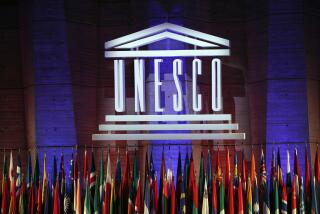America Should Rejoin a Reformed UNESCO
- Share via
When the Reagan Administration took the United States out of the United Nations Educational, Scientific and Cultural Organization (UNESCO) at the end of 1984, it aimed to send a political shock wave throughout the U.N. system. Charging the organization with excessive politicization, lack of budgetary restraint and poor management, the Administration conditioned the United States’ return on operational, management and financial changes at the organization.
The time to make that return is now. Reforms are under way at UNESCO that Americans across the political spectrum agree were needed. And it serves no conceivable interest for our country to sit isolated outside the agency that lies at the center of world’s flow of ideas as it promotes literacy, education, science, environmental protection, cultural preservation and the free flow of information.
Recent changes at UNESCO now warrant a reassessment of the complaints that prompted our decision to withdraw. A new director general, Federico Mayor Zaragoza, has steered the organization away from political divisiveness and toward practical programs that enjoy wide support. He has discarded program rhetoric that troubled advocates of freedom of communication in the West. He has produced a new program budget that emphasizes UNESCO’s successful core programs in accordance with the tight budgetary restrictions the agency has adopted.
Mayor has drafted a medium-term plan that outlines the organization’s directions for 1990-1995. It charts a new path for UNESCO, one that returns to the organization’s original vision of direct involvement of the world’s intellectual communities in building a peaceful world.
As science, education, communications, humanities and cultural preservation increasingly take on international dimensions, our participation in shaping global activities through UNESCO becomes even more urgent. The American scientific, educational and cultural communities are collectively calling for a U.S. return as they watch missed opportunities to participate in ground-breaking ventures in their fields. UNESCO, too, is feeling the absence of American expertise in these fields.
Meanwhile, the Soviet Union has taken advantage of the United States’ absence to assert leadership in many of UNESCO’s fields and offer a positive vision for the future of the organization. Foreign Minister Eduard A. Shevardnadze has affirmed the Soviets’ desire to be “constructive and trailblazing contributors to UNESCO’s activity.” UNESCO occupies an important place in Mikhail S. Gorbachev’s vision of our changing world. In contrast, by abandoning an important agency for multilateral action, the United States is forfeiting an opportunity to promote Western values in the world’s most important sectors for the future.
We also risk paying a high price politically. The United States is going to great lengths to protect our efforts to move the Middle East peace process by fighting the efforts of the Palestine Liberation Organization to gain admission to U.N. specialized agencies and, thus, political legitimacy as a state.
But, as things now stand, we will not be there to fight the PLO’s application for membership in UNESCO. At best, we can hope that later this year the UNESCO membership will follow the lead of the World Health Organization, which voted this past spring to defer the PLO’s application for one year.
Human creativity and interchange are fostered by the ideals of UNESCO. This, essentially, is why Americans must be a part of the agency. Our country has much to contribute to, and possibly even more to learn from, this forum of intellectual cooperation and collaboration.
More to Read
Sign up for Essential California
The most important California stories and recommendations in your inbox every morning.
You may occasionally receive promotional content from the Los Angeles Times.










